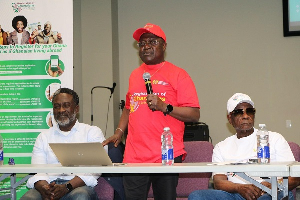Business News of Wednesday, 11 September 2024
Source: www.ghanaweb.com
In a major step to extend Ghana Card services to Ghanaians living outside the country, the National Identification Authority (NIA) has begun issuing cards to Ghanaians in Ottawa and Ontario in Canada under the first phase of the pilot exercise.
The pilot phase has commenced in Ottawa and Ontario in Canada and will be extended to Washington, D.C., and New York in the United States of America.
Last week, officials from the NIA and its technical partner, Identity Management Systems (IMS), held public engagements in Ottawa and Ontario. Following this, they trained selected officials of Ghana’s mission in Canada.
These staff members are working as registration officers in the first phase of the pilot exercise to register Ghanaians abroad.
Officials from the NIA and IMS are currently in New York to hold public engagements and train embassy staff to serve as registration officers.
Ghanaians abroad can fill out forms online and pay the required fees to book appointments from their homes. Applicants and their sponsors are interviewed online.
Applicants only need to go to the mission at their appointed date and time to provide their biometrics and receive their cards. This process is expected to take only 10 minutes, making it more flexible.
Fees approved by parliament for the registration vary by region. ECOWAS nationals pay $55, other Africans pay $75, and individuals from other regions pay $115.
Foreign registration covers individuals aged six and above. Valid passports and birth certificates are required, but applicants without these documents can be vouched for during the interview process. Dual citizens who can prove their Ghanaian heritage are eligible to acquire the Ghana card.
NIA Board Chairman, Abel Edusei described the engagement as a major milestone in the NIA’s work to identify Ghanaians around the world.
He noted that the engagement in Ottawa is historic and a significant step in the NIA’s effort to extend the Ghana Card beyond the borders of Ghana.
NIA Executive Secretary Professor Kenneth Agyemang Attafuah announced plans to train the staff of Ghana’s missions to handle registrations.
He explained that NIA is legally mandated to train these officials as registration officers.
Prof. Attafuah also discussed the NIA’s mandate, achievements, and the integration of the Ghana Card into the ECOWAS system to avoid the need for a separate ECOWAS identity card.
Prof. Attafuah highlighted the security features of the National Identification System (NIS) and clarified that first-time registration for the Ghana Card is free at NIA district and regional offices in Ghana. However, registration at premium centers or for institutions and groups incurs a fee.
Card holders will need to pay for a new card when their existing one expires after 10 years.
Prof. Attafuah explained that the Ghana Card’s Personal Identification Number (PIN) serves as a replacement for various identification numbers.
Responding to questions, Executive Director of IMS, Mr. Emmanuel Selby, assured participants that all data is stored in Ghana and not in the cloud. Private virtual networks are used from the registration centers to NIA’s site.
James Cantamantu-Koomson, Chief Operating Officer of IMS, explained that biometric verification is done for every transaction to prevent identity theft, as visual inspection of cards poses risks.
Ghana’s Ambassador to Canada, Anselm Ransford Adjetey Sowah, organised the interaction in Ottawa.
Participants expressed their gratitude for the education about the Ghana Card registration process, describing it as very useful.
 Kanawu Radio number 1 news portal
Kanawu Radio number 1 news portal

